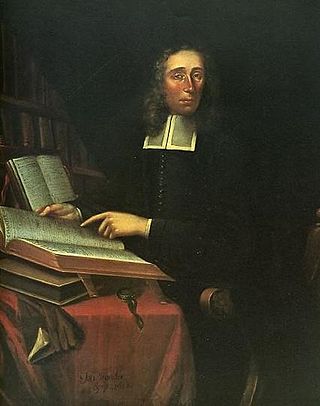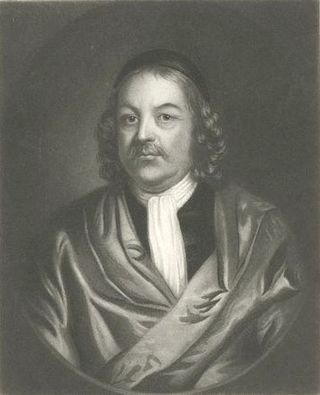
Cotton Mather was a Puritan clergyman and author in colonial New England, who wrote extensively on theological, historical, and scientific subjects. After being educated at Harvard College, he joined his father Increase as minister of the Congregationalist Old North Meeting House in Boston, Massachusetts, where he preached for the rest of his life. He has been referred to as the "first American Evangelical".

The Salem witch trials were a series of hearings and prosecutions of people accused of witchcraft in colonial Massachusetts between February 1692 and May 1693. More than 200 people were accused. Thirty people were found guilty, nineteen of whom were executed by hanging. One other man, Giles Corey, died under torture after refusing to enter a plea, and at least five people died in the disease-ridden jails.

Increase Mather was a New England Puritan clergyman in the Massachusetts Bay Colony and president of Harvard College for twenty years (1681–1701). He was influential in the administration of the colony during a time that coincided with the notorious Salem witch trials.
John Hathorne was a merchant and magistrate of the Massachusetts Bay Colony and Salem, Massachusetts. He is best known for his early and vocal role as one of the leading judges in the Salem witch trials.

Joseph Dudley was a colonial administrator, a native of Roxbury in Massachusetts Bay Colony, and the son of one of its founders. He had a leading role in the administration of the Dominion of New England (1686–1689), which was overthrown in the 1689 Boston revolt. He served briefly on the council of the Province of New York, from which he oversaw the trial which convicted Jacob Leisler, the ringleader of Leisler's Rebellion. He then spent eight years in England in the 1690s as Lieutenant-Governor of the Isle of Wight, including one year as a Member of Parliament for Newtown. In 1702, he returned to New England after being appointed governor of the Province of Massachusetts Bay and Province of New Hampshire, posts that he held until 1715.

Simon Bradstreet was a New England merchant, politician and colonial administrator who served as the last governor of the Massachusetts Bay Colony. Arriving in Massachusetts on the Winthrop Fleet in 1630, Bradstreet was almost constantly involved in the politics of the colony but became its governor only in 1679.

Sir William Phips was born in Maine in the Massachusetts Bay Colony and was of humble origin, uneducated, and fatherless from a young age but rapidly advanced from shepherd boy to shipwright, ship's captain, and treasure hunter, the first New England native to be knighted, and the first royally appointed governor of the Province of Massachusetts Bay. Phips was famous in his lifetime for recovering a large treasure from a sunken Spanish galleon but is perhaps best remembered today for establishing the court associated with the infamous Salem Witch Trials, which he grew unhappy with and was forced to prematurely disband after five months.
Thomas Danforth was a politician, magistrate, and landowner in the Massachusetts Bay Colony. A conservative Puritan, he served for many years as one of the colony's councilors and magistrates, generally leading opposition to attempts by the English kings to assert control over the colony.

William Stoughton was a New England Puritan magistrate and administrator in the Province of Massachusetts Bay. He was in charge of what have come to be known as the Salem Witch Trials, first as the Chief Justice of the Special Court of Oyer and Terminer in 1692, and then as the Chief Justice of the Superior Court of Judicature in 1693. In these trials he controversially accepted spectral evidence. Unlike some of the other magistrates, he never admitted to the possibility that his acceptance of such evidence was in error.
Thomas Hinckley was the last governor of the Plymouth Colony. Born in England, he arrived in New England as a teenager, and was a leading settler of what is now Barnstable, Massachusetts. He served in a variety of political and military offices before becoming governor of the colony in 1680, a post he held until the colony was folded into the Province of Massachusetts Bay in 1692. A monument, created in 1829 at the Lothrop Hill cemetery in Barnstable, attests to his "piety, usefulness and agency in the public transactions of his time."
John Saffin was an English-born merchant, politician, judge, and poet. He is best known for the work A Brief and Candid Answer, which was written in response to Samuel Sewall's The Selling of Joseph, and for a small collection of poetry, most of which was not published until the 20th century. Literary historian Harrison Meserole ranks Saffin as "seventh or eighth" among colonial American poets.

Jonathan Corwin was a New England merchant, politician, and magistrate. He is best known as one of the judges involved in the Salem witch trials of 1692, although his later work also included service as an associate justice of the Massachusetts Superior Court of Judicature, the highest court of the Province of Massachusetts Bay.
Thomas Brattle was an American merchant who served as treasurer of Harvard College and member of the Royal Society. He is known for his involvement in the Salem Witch Trials and the formation of the Brattle Street Church.

Elisha Cooke was a wealthy Massachusetts physician, politician, and businessman who was elected Speaker of the Massachusetts Bay Assembly in 1683. He was the leader of the "popular party", a faction in the Massachusetts House that resisted encroachment by royal officials on colonial rights embodied in the Massachusetts Charter. This role was taken up by his son, Elisha Cooke Jr.

Waitstill Winthrop was a colonial magistrate, military officer, and politician of New England.
Isaac Addington was an American lawyer who served as the Chief Justice of the Superior Court of Judicature, the highest court in the Province of Massachusetts Bay.
Dudley Bradstreet was an American magistrate who served as the Justice of the Peace of Andover, Massachusetts during the Salem Witch Trials.

Abigail Barker was among those accused of witchcraft during the Salem witch trials of 1692.











